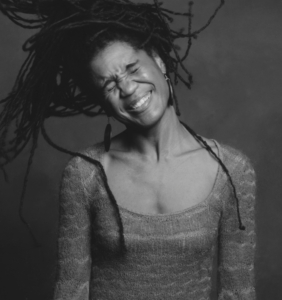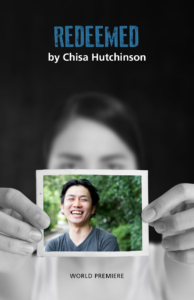INTERVIEW WITH CHISA HUTCHINSON
Researched, interviewed, and edited by Sharon J. Anderson, CATF Honorary Board Member
CATF: Why a play featuring a domestic white male terrorist and a Chinese-American woman?
CH: During the pandemic, there was a ridiculous uptick in anti-Asian hate, and it really pissed me off. I didn’t know what I could do other than write about it. All I’ve got are words. I was not just trying to make some sense of it, but also trying to make at least one responsible party accountable.
How did you research this?
When I was younger, my mother became pen pals with a guy in prison, and she used to take me with her. At one time, I taught playwriting workshops at detention facilities, but they were mostly for juveniles. I also worked with a women’s prison association as a mentor, partnering with women who were about to be released. I learned that it is not necessarily the case that people in prison are vicious – at least those I met in juvenile and women detention facilities.
This play was originally a radio play – how will it be different as a stage play?
When I write Audible plays – in real time and usually only one or two characters talking – I try to drop the audience into it with a specific fly-on-the-wall situation; witnessing a character or a couple of characters processing something. There’s no breaking of the fourth wall – none of those conventions of a one-or-two person play. That works fine when the audience has to imagine what the physical environment is like. Sound effects help to engage you and your mind in more actively piecing together the picture. But when the picture is presented to you live, you need something else other than two people sitting there talking. So it will be a challenge figuring out what we can offer the audience in terms of engagement to keep them leaning forward and leaning in. I’d like to think that there are enough twists and turns and chess moves in this play to keep the audience engaged.
You are a master of dialogue . . .
I’m a sponge, a word nerd. I find speech patterns very fascinating. I probably should have been a linguist or something. I like what speech says about people. I like the colorful way that people express themselves in different regions or different cultures. There is so much personality in language. You can’t ignore it.
In the play, your character, Claire says to Trevor that the most insulting way to be white is to be, “faux-woke white. Being that guy who’s juuuuust aware enough to see the problem and thinks that’s enough. Like stops short of taking action in his own life to rectify it.” I was convicted by this. I wondered if I was “faux-woke white.”
I love that you were convicted by that, and I hope that other people question themselves in that way. That’s the beautiful thing about theater: you can go and watch a play and see a character whom you maybe don’t like but in whom you recognize a little bit of yourself. You can relate to that character in quiet shame and you don’t really have to out yourself. You can just quietly process that and maybe do something different; change your behavior or begin to recognize the qualities you hated in that character are manifested in your actions with other people.
It’s like the Lady Antebellum band wanting to change its name to “Lady A” because “antebellum” had Gone with the Wind associations. “Lady A” was also the name of a Black female jazz singer. The group sued Lady A, apparently not recognizing the racial connotations of a white band suing a Black female jazz singer for a name. Spare us the performative “wokeness” by which I mean not putting it into practice, but just continuing to reap the benefits of being white; just continuing to disenfranchise, marginalize and oppress the very people you are supposedly supporting.
Claire, your Chinese-American character, has her own prejudices against the LGBT community, and doesn’t she also harbor some white-male racism?
I don’t believe that there is white-male racism. I don’t want to excuse Claire at all, but it was also not my intention to vilify her. I wanted to depict a person who has strong opinions about the dude who was dating her murdered brother. Yes, there may be a little bit of bigotry informing those opinions, but certainly not to the point that she’s going to rob a person of his life.
Claire says at one point, “Someone who has wronged you irreparably has the power to destroy you.” Isn’t that what she’s doing to Trevor?
Yes, but she’s not going to murder him.
Is it soul murder?
But is there a soul to murder? Trevor has already murdered his soul by killing Claire’s brother.
Trevor says he is seeing and speaking to the ghost of Claire’s brother and there was a ghost in your play Whitelisted. What’s this thing with the paranormal?
With Whitelisted, I wanted to show that there were other means for achieving some semblance of justice; that there are karmic, cosmic forces at work to even things out; to hold the people who need to be held accountable, accountable. I go to the paranormal for that because we are clearly not going to get that justice on this plane. We’ve got to go for the supernatural for that because the natural ain’t doing shit for us.
Do you believe in redemption?
I think that people who do wrong and who commit such vicious offenses have been brainwashed somehow; have been wrongly conditioned into thinking those things are okay or that they are justifiable. Where the potential for redemption comes in is a sort of “un-brainwashing,” or “re-brainwashing” into doing the right thing. Not a brow-beating, but a soul-punching into realizing the true nature of the offense that has been committed. It may not be possible for certain folks to unlearn what they were wrongly taught, but I have to believe it is possible, otherwise, I would just jump off a bridge.
Have you ever experienced redemption?
I should hope so.
What was redemption like for you?
I’m OCD, so it comes at 3 o’clock in the morning when I lie awake thinking about that thing that I did 26 years ago to that person and wondering if I should reach out, find them on Facebook and apologize. For some people, Facebook has become the tool for redemption.
Do you think redemption is possible outside of a religious context?
Oh, sure. A lot of the ways we offend people have nothing to do with religion. For example, when people try to negate your perspective or basically gaslight you in believing that their perspective is the only one possible – that’s a violation, an intellectual violation, an experiential violation. It’s nice to have someone recognize that and apologize.
John Berger, the critic, novelist, painter, and poet, said: “The strange power of art is sometimes it can show that what people have in common is more urgent than what differentiates them. It seems to me it’s something the theater can do . . . .”
I read somewhere that when people watch live theater together, their heartbeats synch up. It might be a Snapple cap thing, but I did hear that. That thought really excites me.
Michael R. Jackson, who won the Pulitzer and Tony for A Strange Loop said this in a New Yorker article (4/10/23) about the transformative effect of the theater: “You have to know what is actually for real, not just some lame-ass, woke-ass political statement that you really haven’t thought through. Tell the truth.”
That is so spot-on for Michael Jackson. I love this dude. He’s one of the only Black playwrights right now who is killing it with his original ideas. Right now there are so many other commissioned plays by Black writers that are all reworks of a dead white guy’s play. It’s frustrating. Someone approached me about rewriting The Cherry Orchard with a setting in Martha’s Vineyard and the Black community. I did Terms of Endearment and Oliver Twist and after those, I decided I can’t do any more adaptations. They are either going to take my idea or come at me with an idea that is specifically about People of Color. I am not going to spread my Black girl magic on these dead white guy stories. That’s not what I’m here for. My original ideas are just as valid and just as universal. To insist otherwise is just perpetuating a more insidious form of racism.
When you were writing Redeemed did the characters teach you anything that you weren’t expecting?
I literally had no idea how I was going to end this play when I sat down to write it. I just start plays and then I discover stuff and I’ll keep writing until I reach some sort of logical conclusion. The characters really do nudge. It’s a bizarre feeling. Mostly by the time I’m done with the play, I learn where I’m at with how optimistic or cynical I’m feeling about the world in general – my characters influence that.
What’s your greatest strength?
Empathy.
What’s your greatest weakness?
Empathy.


